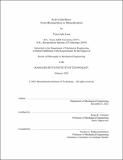Active Interfaces: From Biointerfaces to Mineralization
Author(s)
Leon, Victor Julio
DownloadThesis PDF (4.842Mb)
Advisor
Varanasi, Kripa K.
Terms of use
Metadata
Show full item recordAbstract
Novel technologies that can help adapt to and mitigate climate change are needed. In this thesis, we develop three different technologies that tackle climate change from different angles. First, a fundamental study is conducted on a novel boiling droplet self-propulsion phenomenon that occurs when a surface is coated with a thin oil film. A scaling model is developed that predicts the velocity of the self-propelling droplet, and the model is used to estimate the increase in critical heat flux, which typically limits the efficiency of heat transfer in power plants. Second, we design a nano-engineered surface that increases the capture rate of CO₂ bubbles with a surrounding reactive liquid by 100x compared to normal surfaces. On a system level, our surface is 1000x more volumetrically efficient (1 kgCO₂/s/m³) than conventional CO₂ capture towers currently used on power plants (1 gCO₂/s/m³), paving the way towards smaller scale, modular CO₂ capture units that could be used on smaller point sources like cars and buildings. Finally, we design nanometric, high performance dielectric films to reduce the required cleans of algae photobioreactor walls by 3x, which would increase the efficiency of the conversion of captured CO₂ to value products using algae. By applying low voltage (~1V) and power (~1nW), the electrostatic interaction between the algae cell and dielectric surface can be modulated to either enhance or inhibit cell adhesion rate. As such, the films are also used to pattern cells on surfaces. Overall, this thesis makes contributions towards the adaption to and mitigation of climate change by improving the performance of current technologies (increasing critical heat flux of boiling droplets), improving CO₂ capture (nano-engineered bubble capture), and improving CO₂ conversion to value products (nanometric, dielectric films for algae photobioreactors).
Date issued
2023-02Department
Massachusetts Institute of Technology. Department of Mechanical EngineeringPublisher
Massachusetts Institute of Technology